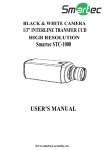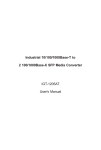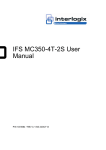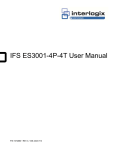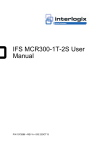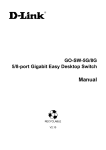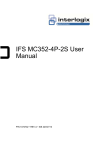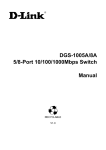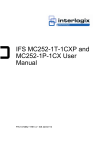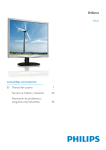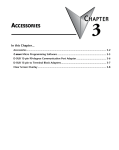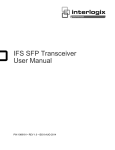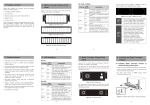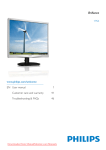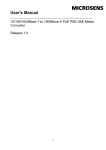Download IFS MC350-1T-2S User Manual
Transcript
IFS MC350-1T-2S User Manual P/N 1072683 • REV A • ISS 22OCT13 Copyright © 2013 United Technologies Corporation Interlogix is part of UTC Climate Controls & Security, a unit of United Technologies Corporation. All rights reserved. Trademarks and patents The IFS MC350-1T-2S name and logo are trademarks of United Technologies. Other trade names used in this document may be trademarks or registered trademarks of the manufacturers or vendors of the respective products. Manufacturer Interlogix 3211 Progress Drive, Lincolnton, NC 28092 USA Authorized EU manufacturing representative: UTC Climate Controls & Security B.V., Kelvinstraat 7, 6003 DH Weert, Netherlands Intended use Use this product only for the purpose it was designed for; refer to the data sheet and user documentation for details. For the latest product information, contact your local supplier or visit us online at www.interlogix.com. Certification N4131 FCC compliance This equipment has been tested and found to comply with the limits for a Class A digital device, pursuant to part 15 of the FCC Rules. These limits are designed to provide reasonable protection against harmful interference when the equipment is operated in a commercial environment. This equipment generates, uses, and can radiate radio frequency energy and, if not installed and used in accordance with the instruction manual, may cause harmful interference to radio communications. You are cautioned that any changes or modifications not expressly approved by the party responsible for compliance could void the user's authority to operate the equipment. ACMA compliance Notice! This is a Class A product. In a domestic environment this product may cause radio interference in which case the user may be required to take adequate measures. Canada This Class A digital apparatus complies with Canadian ICES-003. Cet appareil numérique de la classe A est conforme á la norme NMB-003du Canada. European Union directives 2004/108/EC (EMC Directive): Hereby, UTC Climate Controls & Security Corporation, Inc. declares that this device is in compliance with the essential requirements and other relevant provisions of Directive 2004/108/EC. Contact Information For contact information, see www.interlogix.com or www.utcfssecurityproducts.eu. 2 TABLE OF CONTENTS 1. INTRODUCTION……………………………………………………………………………………4 2 1.1 PACKAGE CONTENTS ..............................................................................................................4 2 1.2 HOW TO USE THIS MANUAL.....................................................................................................4 2 1.3 PRODUCT FEATURES ..............................................................................................................5 3 1.4 PRODUCT SPECIFICATIONS .....................................................................................................6 3 1.5 PHYSICAL DIMENSIONS ...........................................................................................................8 3 2. INSTALLATION……………………………………………………………………………………9 3 2.1 PRODUCT DESCRIPTION ..........................................................................................................9 3 2.1.1 Converter Front Panel .................................................................................................10 4 2.1.2 LED Indicators .............................................................................................................11 4 2.1.3 Converter Upper Panel................................................................................................12 4 2.1.4 Wiring the Power Inputs ..............................................................................................13 4 2.1.5 Wiring the Fault Alarm Contact ...................................................................................14 4 2.1.6 Cabling ........................................................................................................................15 5 2.1.7 Redundancy Overview ................................................................................................20 5 2.2 MOUNTING INSTALLATION......................................................................................................21 5 2.2.1 Install DIN-Rail Mounting.............................................................................................21 5 2.2.2 Wall Mount Plate Mounting .........................................................................................23 5 3. APPLICATION…………………………………………………………………………………….24 6 4. TROUBLESHOOTING……………………………………………………………………………26 6 5. CABLE CONNECTION PARAMETERS………………………………………………………..27 6 APPENDIX A: NETWORKING CONNECTION……………………………………….................28 6 3 1. INTRODUCTION 1.1 Package Contents Check the contents of your package for the following parts: ● Industrial Gigabit Media Converter x 1 ● User's Manual x 1 If any of these are missing or damaged, please contact your dealer immediately; if possible, retain the carton including the original packing material, and use them against to repack the product in case there is a need to return it to us for repair. The term “Industrial Gigabit Media Converter” mentioned in this user’s manual also means the MC350-1T-2S. 1.2 How to Use This Manual This Industrial Gigabit Media Converter User Manual is structured as follows: Chapter 2 Installation The chapter explains the feature, functionality and the physical installation of the Industrial Gigabit Media Converter. Chapter 3 Application The chapter explains the Industrial Gigabit Media Converter application. Chapter 4 Troubleshooting The chapter explains the troubleshooting of the Industrial Gigabit Media Converter. Chapter 5 Cable Connection Parameters The chapter contains the cable connection parameters of the Industrial Gigabit Media Converter. Appendix A This chapter contains cable information of the Industrial Gigabit Media Converter. 4 1.3 Product Features Physical Port 1-port 10/100/1000Base-T RJ-45 with auto MDI / MDI-X function 2 SFP interfaces, 100/1000Base-X dual mode (DIP switch control) Layer 2 Features IEEE 802.3 / 802.3u / 802.3ab / 802.3z Ethernet Standard Compliant Supports Auto-negotiation and 10/100Mbps half / full duplex and 1000Mbps full duplex mode Prevents packet loss with back pressure (Half-Duplex) and IEEE 802.3x PAUSE frame flow control (Full-Duplex) 9K Jumbo Frame Size support Automatic address learning and address aging Industrial Case / Installation Slim type IP30 metal case / protection DIN Rail and Wall Mount Design Redundant Power Design - 12 to 48V DC, redundant power with polarity reverse protect function - AC 24V power adapter acceptable Supports EFT protection for 6000 VDC for power line Supports 6000 VDC Ethernet ESD protection -40 to 75 degrees C operating temperature Fiber Port Redundancy Once enable fiber redundant function, port 1 will be “Primary Port” and port 2 will be “Backup Port”. Link status auto-detect and redundant on Dual ports with same connector type Only when Primary-Port is active, the Backup-Port is blocked When Primary-Port link fails, the traffic will swap to Backup-Port automatically Once the Primary-Port status is back to link up, the traffic will swap from Backup-Port to Primary-Port 5 1.4 Product Specifications Model MC350-1T-2S Hardware Specification 10/100/1000Base-T Ports SFP Interfaces 1 2 1000Base-SX/LX/BX SFP interfaces (Port-1 and Port-2) Compatible with 100Base-FX SFP Dimensions (W x D x H) 135 x 87 x 32mm Weight 505g Power Requirements Power Consumption / Dissipation Installation DC 12~48V, Redundant power with polarity reverse protection function. AC 24V Power Adapter 8.4 watts / 28BTU DIN Rail Kit and Wall Mount Ear Converter Specification Processing Scheme Flow Control Fabric Store-and-Forward Back pressure for half duplex IEEE 802.3x Pause Frame for full duplex 6Gbps Throughput (packet per second) 4.46Mpps Maximum Transmission Unit 9216bytes 10/100/1000Base-T: Cat. 3, 4, 5, 5e, 6 UTP cable (100meters, max.) EIA/TIA-568 100-ohm STP (100meters, max.) 1000Base-SX : 50/125μm or 62.5/125μm multi-mode fiber optic cable, up to 550m (vary on SFP module) Network Cables 1000Base-LX : 9/125μm single-mode fiber optic cable, up to 10/20/30/40/50/70/120 kilometers (vary on SFP module) 100Base-FX : 50/125μm or 62.5/125μm multi-mode fiber optic cable, up to 2 kilometers (vary on SFP module) 9/125μm single-mode fiber optic cable, up to 20/40/60 kilometers (vary on SFP module) Standards Conformance IEEE 802.3 Ethernet Standards Compliance IEEE 802.3u Fast Ethernet IEEE 802.3ab Gigabit Ethernet 6 IEEE 802.3z Gigabit Ethernet IEEE 802.3x Full-Duplex Flow Control Regulation Compliance FCC Part 15 Class A, CE IEC60068-2-32 (Free fall) Stability Testing IEC60068-2-27 (Shock) IEC60068-2-6 (Vibration) Environment Temperature Humidity Operating: -40~75 degrees C Storage: -40~75 degrees C Operating: 5~95% (Non-condensing) Storage: 5~95% (Non-condensing) 7 1.5 Physical Dimensions MC350-1T-2S Industrial Gigabit Media Converter dimensions (W x D x H): 135 x 87 x 32mm 8 2. Installation This section describes the functionalities of the Industrial Gigabit Media Converter’s components and guides how to install it on the desktop. Basic knowledge of networking is assumed. Please read this chapter completely before continuing. 2.1 Product Description Flexibility and Network Distance Extension Solution The MC350-1T-2S Industrial Gigabit Media Converter is equipped with one 10/100/1000Base-T auto-negotiation port and two 100/1000X SFP slots. The two SFP slots are compatible with 1000Base-SX / LX or 100Base-FX through SFP (Small Form Factor Pluggable) fiber-optic transceiver; the two SFP slots allow changing the operation speed mode with its built-in DIP switch. The fiber optical uplink capability guarantees the throughput to all nodes hooked into the network and the Gigabit Ethernet distance can be extended from 550 meters (Multi-Mode fiber cable) up to 10/20/30/50/60 kilometers (Single-Mode fiber cable), also the Fast Ethernet distance can be extended from 2km (Multi-Mode fiber cable) up to 20/40/60 kilometers (Single-Mode fiber cable). They are well suited for applications within the factory data centers and distributions. Adjustable 3-Port Switch Mode or 2 Fiber Port Redundant Mode Via the built-in DIP-switch, the two SFP fiber interfaces of MC350-1T-2S can be configured as Ethernet switch mode or Fiber Redundant mode. With the Ethernet switch mode, it can operate Store-and-Forward mechanism with high performance; with the 2-Port Fiber Redundant mode, it provides redundancy of link for highly critical Ethernet applications. The redundant mode supports auto-recover function. If the destination port of a packet is link down, it forwards the packet to the other port of the backup pair. Environmentally Hardened Design With IP30 metal industrial case protection, the MC350-1T-2S provides a high level of immunity against electromagnetic interference and heavy electrical surges which are usually found on plant floors or in curb side traffic control cabinets. It also possesses an integrated power supply source with wide range of voltages (12 to 48V DC or 24V AC) for worldwide high availability applications requiring dual or backup power inputs. Being able to operate under the temperature range from -40 to 75 degrees C, the MC350-1T-2S can be placed in almost any difficult environment. The compact IP30 standard metal case of MC350-1T-2S allows either DIN rail or wall mounting for efficient use of cabinet space. Robust Gigabit Media Converter Performance The MC350-1T-2S offers wire-speed packets transfer performance without risk of packet loss. The high data throughput of the device makes it ideal for most Gigabit environments. With a 6Gbps internal fabric and featuring auto negotiation support in its Gigabit port, the MC350-1T-2S Industrial Gigabit Media Converter can handle large amounts of data in a secure topology linking to a backbone or high capacity servers. The flow control function enables the MC350-1T-2S to provide fast and reliable data transfer. The RJ-45 copper interface in the MC350-1T-2S supports 10/100/1000Mbps Auto-Negotiation for optimal speed detection through RJ-45 Category 6, 5 or 5e cables. The standard Auto-MDI/MDI-X support can detect the type of connection to any Ethernet device without requiring special straight or crossover cables. 9 2.1.1 Converter Front Panel Figure 2-1 shows the front panel of Industrial Gigabit Media Converter. Figure 2-1: MC350-1T-2S Front Panel 10 2.1.2 LED Indicators System LED Color Function P1 Green Lit: indicate power 1 has power. P2 Green Lit: indicate power 2 has power. FAULT Green Lit: indicate either power 1 or power 2 has no power. Per 10/100/1000T Port LED Color 100 LNK/ACT Orange 1000 LNK/ACT Green Function Lit: indicate the link through that port is successfully established at 100Mbps or 10Mbps. Blink: indicate that the Switch is actively sending or receiving data over that port. Off: indicate the link through that port is successfully established at 1000Mbps. Lit: indicate the link through that port is successfully established at 1000Mbps or 10Mbps. Blink: indicate that the Switch is actively sending or receiving data over that port. Off: indicate the link through that port is successfully established at 100Mbps. Per 100 / 1000X SFP Slots LED LNK/ACT Color Green Function Lit: indicate the link through that port is successfully established at 100Mbps or 1000Mbps. Blink: indicate that the Converter is actively sending or receiving data over that port or the port operate. 11 2.1.3 Converter Upper Panel The upper panel of the Industrial Gigabit Media Converter consists of one terminal block connector within two DC power inputs, and also provides 3 DIP Switches for 100/1000X fiber support on two SFP slots and fiber redundant function. Figure 2-2 shows the upper panel of the Industrial Gigabit Media Converter. Figure 2-2: Industrial Gigabit Media Converter Upper Panel The 3 DIP switch settings and descriptions: ON OFF Port 1 (DIP 1) 100FX 1000X Port 2 (DIP 2) 100FX 1000X Fiber Redundant Switch Fiber Mode (DIP 3) The fiber redundancy function explains in chapter 2.1.7 Redundancy Overview. 12 2.1.4 Wiring the Power Inputs The 6-contact terminal block connector on the top panel of Industrial Gigabit Media Converter is used for two DC redundant power inputs. Please follow the steps below to insert the power wire. 1. Insert positive / negative DC power wires into contacts 1 and 2 for POWER 1, or 5 and 6 for POWER 2. V1- V1 + 2. V2 - V2 + Tighten the wire-clamp screws for preventing the wires from loosening. 1 2 Power 1 - 3 4 5 Fault 6 Power 2 + - + The wire gauge for the terminal block should be in the range between 12 and 24 AWG. 13 2.1.5 Wiring the Fault Alarm Contact The fault alarm contacts are in the middle of the terminal block connector as the picture shows below. Inserting the wires, the Industrial Gigabit Media Converter will detect the fault status of the power failure and then forms an open circuit. The following illustration shows an application example for wiring the fault alarm contacts. 1 2 3 4 5 6 Insert the wires into the fault alarm contacts The wire gauge for the terminal block should be in the range between 12 and 24 AWG. 14 2.1.6 Cabling 10/100/1000Base-T and 100Base-FX / 1000Base-SX/LX The 10/100/1000Base-T port comes with Auto-Negotiation capability. It automatically supports 1000Base-T, 100Base-TX and 10Base-T networks. Users only need to plug a working network device into the 10/100/1000Base-T port, and then turn on the Industrial Gigabit Media Converter. The port will automatically runs in 10Mbps, 20Mbps, 100Mbps or 200Mbps and 1000Mbps or 2000Mbps after the negotiation with the connected device. The Industrial Gigabit Media Converter has two SFP interfaces that supports 100/1000 dual speed mode (Optional Multi-mode / Single-mode 100Base-FX / 1000Base-SX/LX SFP module) through DIP switch setting. Cabling The 10/100/1000Base-T port uses RJ-45 socket -- similar to phone jack -- for connection of unshielded twisted-pair cable (UTP). The IEEE 802.3 / 802.3u / 802.3ab Fast / Gigabit Ethernet standard requires Category 5 UTP for 100Mbps 100Base-TX. 10Base-T networks can use Cat.3, 4, 5 or 1000Base-T uses 5/5e/6 UTP (see table below). Maximum distance is 100 meters (328 feet). The 100Base-FX / 1000Base-SX/LX SFP slot is used as LC connector with optional SFP module. Please see table below and know more about the cable specifications. Port Type Cable Type Connector 10Base-T Cat 3, 4, 5, 2-pair RJ-45 100Base-TX Cat.5 UTP, 2-pair RJ-45 1000Base-T Cat.5/5e/6 UTP, 4-pair RJ-45 100Base-FX 50 / 125µm or 62.5 / 125µm multi-mode 9 / 125µm single-mode LC (Multi / Single mode) 1000Base-SX/LX 50 / 125µm or 62.5 / 125µm multi-mode 9 / 125µm single-mode LC (Multi / Single mode) Any Ethernet devices like hubs/ PCs can be connected to the Industrial Gigabit Media Converter by using straight-through wires. The 10/100/1000Mbps port is auto-MDI/MDI-X and can be used on straight-through or crossover cable. 15 2.1.6.1 Installing the SFP Transceiver The sections describe how to insert an SFP transceiver into an SFP slot. The SFP transceivers are hot-pluggable and hot-swappable. You can plug in and out the transceiver to/from any SFP port without having to power down the Industrial Gigabit Media Converter as Figure 2-3 shows.. Figure 2-3: Plug in the SFP Transceiver Approved IFS SFP Transceivers IFS Industrial Gigabit Media Converter supports 100/1000 dual mode with both Single mode and Multi-mode SFP transceivers. The following list of approved IFS SFP transceivers is correct at the time of publication: Gigabit SFP Transceiver Modules IFS Model S30 SFP Description S30-1SLC/A-10 SFP, LC Connector, Single Mode, Gigabit, 1 fiber, 1310nm/1550nm, 10km , A End S30-1SLC/A-20 SFP, LC Connector, Single Mode, Gigabit, 1 fiber, 1310nm/1550nm, 20km, A End S30-1SLC/A-60 SFP, LC Connector, Single Mode, Gigabit, 1 fiber, 1310nm/1550nm, 60km, A End S30-1SLC/B-10 SFP, LC Connector, Single Mode, Gigabit, 1 fiber, 1550nm/1310nm, 10km , B End S30-1SLC/B-20 SFP, LC Connector, Single Mode, Gigabit, 1 fiber, 1550nm/1310nm, 20km, B End S30-1SLC/B-60 SFP, LC Connector, Single Mode, Gigabit, 1 fiber, 1550nm/1310nm, 60km, B End S30-2MLC SFP, LC Connector, Multi Mode, Gigabit, 2 fiber,850nm/850nm, 550m S30-2MLC-2 SFP, LC Connector, Multi Mode, Gigabit, 2 fiber,1310nm/1310nm, 2km S30-2SLC-10 SFP, LC Connector, Single Mode, Gigabit, 2 fiber,1310nm/1310nm, 10km S30-2SLC-30 SFP, LC Connector, Single Mode, Gigabit, 2 fiber,1310nm/1310nm, 30km S30-2SLC-70 SFP, LC Connector, Single Mode, Gigabit, 2 fiber,1550nm/1550nm, 70km S30-RJ SFP, RJ-45, Gigabit, 100m 16 Fast Ethernet SFP Transceiver Modules IFS Model SFP Description SXX S35-2MLC SFP, LC Connector, Multi Mode, Gigabit, 2 fiber,850nm/850nm, 550m, Hardened -40~75°C S35-2SLC-10 SFP, LC Connector, Single Mode, Gigabit, 2 fiber,1310nm/1310nm, 10km, Hardened -40~75°C S35-2SLC-30 SFP, LC Connector, Single Mode, Gigabit, 2 fiber,1310nm/1310nm, 30km, Hardened -40~75°C S35-2SLC-70 SFP, LC Connector, Single Mode, Gigabit, 2 fiber,1550nm/1550nm, 70km, Hardened -40~75°C S20-1SLC/A-20 SFP, LC Connector, Single Mode, 10/100 Fast Ethernet, 1 fiber, 1310nm/1550nm, 20km , A End S20-1SLC/B-20 SFP, LC Connector, Single Mode, 10/100 Fast Ethernet, 1 fiber, 1310nm/1550nm, 20km , B End S20-2MLC-2 SFP, LC Connector, Multi Mode, 10/100 Fast Ethernet, S20-2SLC-20 SFP, LC Connector, Single Mode, 10/100 Fast Ethernet, 2 fiber,1310nm/1310nm, 20km S25-2MLC-2 SFP, LC Connector, Multi Mode, 10/100 Fast Ethernet, S25-2SLC-20 SFP, LC Connector, Single Mode, 10/100 Fast Ethernet, 2 fiber,1310nm/1310nm, 20km, Hardened -40~75°C 2 fiber,1310nm/1310nm, 2km 2 fiber,1310nm/1310nm, 2km, Hardened -40~75°C It is recommended to use IFS SFPs on the Industrial Gigabit Media Converter. If you insert an SFP transceiver that is not supported, the Industrial Gigabit Media Converter will not recognize it. 17 1000Base-SX/LX: Before connecting the other switches, workstation or Media Converter, please do the following: 1. Set the DIP Switch of SFP Port 1 or Port 2 to the “OFF” position with fiber speed 1000Base-X. ON OFF Port 1 (DIP 1) 100FX 1000X Port 2 (DIP 2) 100FX 1000X 2. Make sure both sides of the SFP transceiver are with the same media type; for example, 1000Base-SX to 1000Base-SX, 1000Base-LX to 1000Base-LX. 3. Check whether the fiber-optic cable type matches the SFP transceiver model. ¾ ¾ To connect to 1000Base-SX SFP transceiver, use the Multi-mode fiber cable with one side being the male duplex LC connector type. To connect to 1000Base-LX SFP transceiver, use the Single-mode fiber cable with one side being the male duplex LC connector type. Connect the fiber cable 1. Attach the duplex LC connector on the network cable to the SFP transceiver. 2. Connect the other end of the cable to a device, switches with SFP installed, to fiber NIC on a workstation or a Media Converter. 3. Check the LNK/ACT LED of the SFP slot on the front of the Industrial Gigabit Media Converter. Make sure that the SFP transceiver is operating correctly. 100Base-FX: Before connecting the other switches, workstation or Media Converter, please do the following: 1. Set the DIP Switch of SFP Port 1 or Port 2 to the “ON” position with fiber speed “100FX”. ON OFF Port 1 (DIP 1) 100FX 1000X Port 2 (DIP 2) 100FX 1000X 2. Make sure both sides of the SFP transceiver are with the same media type or WDM pair; for example, 100Base-FX to 100Base-FX, 100Base-BX20-U to 100Base-BX20-D. 3. Check the fiber-optic cable type match the SFP transceiver model. ¾ ¾ To connect to SXX-FX SFP transceiver, use the multi-mode fiber cable with one side being the male duplex LC connector type. To connect to SXX-F20/F40/F60/FA20/FB20 SFP transceiver, use the single-mode fiber cable with one side being the male duplex LC connector type. 18 Connect the fiber cable 1. Attach the duplex LC connector on the network cable to the SFP transceiver. 2. Connect the other end of the cable to a device, switches with SFP installed, to fiber NIC on a workstation or a Media Converter. 3. Check the LNK/ACT LED of the SFP slot of the switch / converter. Make sure that the SFP transceiver is operating correctly. 2.1.6.2 Remove the Transceiver Module 1. Make sure there is no network activity by consulting or checking with the network administrator. Or through the management interface of the switch/converter (if available) to disable the port in advance. 2. Remove the Fiber Optic Cable gently. 3. Turn the lever of the S30/SXX module to a horizontal position. 4. Pull out the module gently through the lever. Figure 2-4: Pulling Out from the Transceiver Never pull out the module without pulling the lever or the push bolts on the module. Directly pulling out the module with violence could damage the module and SFP module slot of the Industrial Gigabit Media Converter. 19 2.1.7 Redundancy Overview The Industrial Gigabit Media Converter provides rapid fiber redundancy of link for highly critical Ethernet applications. The redundant-mode supports auto-recover function. If the destination port of a packet is link down, it forwards the packet to the other port of the backup pair. The following figure shows the redundant function. Figure 2-5: Redundancy Behavior Topology y Link status auto detect and redundant on Dual ports with same connector type. y Only Primary-Port is active at a time, the Backup-Port is blocked. y When Primary-Port link failure occurs, the traffic will swap to Backup-Port automatically. y Once the Primary-Port status is back to link up, the traffic will swap from Backup-Port to Primary-Port. Once enable fiber redundant function, port 1 will be “Primary Port” and port 2 will be “Backup Port”. 20 2.2 Mounting Installation This section describes how to install the Industrial Gigabit Media Converter and makes connections to it. Please read the following topics and perform the procedures in the order being presented. In the installation steps below, this Manual uses IGS-801(IFS 8 Port Industrial Gigabit Switch) as the example. However, the steps for IFS Industrial Switch and Industrial Media Converter are similar. 2.2.1 Install DIN-Rail Mounting The DIN-Rail is screwed on the Industrial Gigabit Media Converter when out of factory. When replacing the wall mount application with DIN-Rail application on Industrial Gigabit Media Converter is needed, please refer to following figures to screw the DIN-Rail on the Industrial Gigabit Media Converter. To hang the Industrial Gigabit Media Converter, follow the following steps: Step 1: Screw the DIN-Rail on the Industrial Gigabit Media Converter. Step 2: Lightly insert the DIN-Rail into the track. 21 Step 3: Make sure the DIN-Rail is tightly secured on the track. Step 4: Please refer to the following procedures to remove the Industrial Gigabit Media Converter from the track. Step 5: Lightly pull out the bottom of the DIN-Rail from the track to remove. 22 2.2.2 Wall Mount Plate Mounting To install the Industrial Gigabit Media Converter on the wall, please follow the instructions described below. Step 1: Remove the DIN-Rail from the Industrial Gigabit Media Converter; loose the screws to remove the DIN-Rail. Step 2: Place the wall mount plate on the rear panel of the Industrial Gigabit Media Converter. Step 3: Use the screws to screw the wall mount plate on the Industrial Gigabit Media Converter. Step 4: Use the hook holes at the corners of the wall mount plate to hang the Industrial Gigabit Media Converter on the wall. Step 5: To remove the wall mount plate, reverse steps above. 23 3. Applications In this paragraph, we will describe how to install the Industrial Gigabit Media Converter. Transportation Networking Industrial Operating Environment 24 Installation Steps Step 1: Unpack the Industrial Gigabit Media Converter. Step 2: Check whether the DIN-Rail is screwed on the Industrial Gigabit Media Converter. (Please refer to DIN-Rail Mounting section for DIN-Rail installation if the DIN-Rail is not screwed on the Industrial Gigabit Media Converter). If you want to wall-mount the Industrial Gigabit Media Converter, then please refer to the Wall Mount Plate Mounting section for wall mount plate installation. Step 3: To hang the Industrial Gigabit Media Converter on the DIN-Rail track or wall, please refer to the Mounting Installation section. Step 4: Power on the Industrial Gigabit Media Converter. (Please refer to the Wiring of the Power Inputs section for power input) The power LED on the Industrial Gigabit Media Converter will light up. Please refer to the LED Indicators section for the functions of LED lights. Step 5: Prepare the twisted-pair, straight through Category 5 cable for Ethernet connection. Step 6: Insert one side of category 5 cable into the Industrial Gigabit Media Converter Ethernet port (RJ-45 port) while the other side of category 5 cable into the network devices' Ethernet port (RJ-45 port), ex: switch, PC or server. The UTP port (RJ-45) LED on the Industrial Gigabit Media Converter will light up when the cable is connected with the network device. Please refer to the LED Indicators section for the functions of LED lights. Step 7: When all connections are all set and LED lights all show normally, the installation is complete. Be sure the connected network devices support MDI/MDI-X. If it does not support, then use the crossover category 5 cable. 25 4. Troubleshooting This chapter contains information to help you solve issues. If the Industrial Gigabit Media Converter is not functioning properly, make sure the Industrial Gigabit Media Converter is set up according to instructions in this manual. The per port LED is not lit Solution: Check the cable connection of the Industrial Gigabit Media Converter. Performance is bad Solution: Check the speed duplex mode of the partner device. The Industrial Gigabit Media Converter is run at Auto-negotiation mode and if the partner is set to half duplex, then the performance will be poor. Per port LED is lit, but the traffic is irregular Solution: Check that the attached device is not set to dedicate full duplex. Some devices use a physical or software switch to change duplex modes. Auto-negotiation may not recognize this type of full-duplex setting. Why the Industrial Gigabit Media Converter doesn’t connect to the network Solution: Check per port LED on the Industrial Gigabit Media Converter. Make sure the cable is installed properly. Make sure the cable is the right type. Turn off the power. After a while, turn on power again. Can I install S3X-S2X or other non wide temperature SFP module into SFP slot of Industrial Gigabit Media Converter? Solution: Yes, you can. However, non wide temperature SFP module cannot operate under -40 to 75 degrees C. 26 5. Cable Connection Parameters The wiring details are as below: ■ 100FX Fiber Optical Cables: Standard Fiber Type Cable Specification 100Base-FX Multi-mode 50/125μm or 62.5/125μm 100Base-FX Multi-mode 50/125μm or 62.5/125μm (1310nm) Single-mode 9/125μm 100Base-BX-U Single-mode 9/125μm (1300nm) (TX :1310/RX :1550) 100Base-BX-D (TX :1550/RX :1310) 1000X Fiber Optical Cables: Standard Fiber Type Cable Specification 1000Base-SX (850nm) Multi-mode 50/125μm or 62.5/125μm 1000Base-LX (1300nm) Multi-mode 50/125μm or 62.5/125μm Single-mode 9/125μm Wiring Distances: Standard Fiber 1000BaseSX MM 1000BaseLX MM SM Diameter (micron) Modal Bandwidth (MHz * km) 62.5 100 62.5 200 50 400 50 500 62.5 5 50 4 50 5 9 N/A Max. Distance (meters) 220 275 500 550 550 5000* Single-mode port (1000Base-LX port) of MC350-1T-2S complies with LX 5 #Notice The kilometers and provides additional margin allowing for a 10/20/40/50/60 kilometer Gigabit Ethernet link on single mode fiber. 27 APPENDIX A: Networking Connection A.1 Converter’s RJ-45 Pin Assignments 1000Mbps, 1000Base-T Contact MDI MDI-X 1 BI_DA+ BI_DB+ 2 BI_DA- BI_DB- 3 BI_DB+ BI_DA+ 4 BI_DC+ BI_DD+ 5 BI_DC- BI_DD- 6 BI_DB- BI_DA- 7 BI_DD+ BI_DC+ 8 BI_DD- BI_DC- 10/100Mbps, 10/100Base-TX RJ-45 Connector pin assignment MDI MDI-X Contact Media Dependant Interface Media Dependant Interface -Cross 1 Tx + (transmit) Rx + (receive) 2 Tx - (transmit) Rx - (receive) 3 Rx + (receive) Tx + (transmit) 4, 5 6 7, 8 Not used Rx - (receive) Tx - (transmit) Not used 28 A.2 RJ-45 Cable Pin Assignments The standard RJ-45 receptacle/connector There are 8 wires on a standard UTP/STP cable and each wire is color-coded. The following shows the pin allocation and color of straight cable and crossover cable connection: Straight Cable 1 1 2 2 3 3 4 4 SIDE 1 5 5 6 6 7 7 8 SIDE 1 8 SIDE 2 Crossover Cable 1 1 2 2 3 3 4 4 5 5 1 = White / Orange 1 = White / Orange 2 = Orange 2 = Orange 3 = White / Green 3 = White / Green 4 = Blue 4 = Blue 5 = White / Blue 5 = White / Blue 6 = Green 6 = Green 7 = White / Brown 7 = White / Brown 8 = Brown 8 = Brown SIDE 1 6 6 7 7 8 SIDE 1 8 SIDE 2 SIDE2 SIDE2 1 = White / Orange 1 = White / Green 2 = Orange 2 = Green 3 = White / Green 3 = White / Orange 4 = Blue 4 = Blue 5 = White / Blue 5 = White / Blue 6 = Green 6 = Orange 7 = White / Brown 7 = White / Brown 8 = Brown 8 = Brown Figure A-1: Straight-Through and Crossover Cable Please make sure your connected cables are with the same pin assignment and color as the above picture before deploying the cables into your network. 29
































